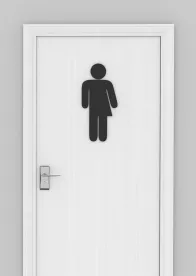On May 30, 2017, a panel of three judges in the U.S. Court of Appeals for the Seventh Circuit unanimously affirmed a preliminary injunction sought by Ashton Whitaker ("Whitaker") against the Kenosha Unified School District (the "District") which allows Whitaker to use the boys' restroom while at school. See Whitaker, et al. v. Kenosha Unified Sch. Dist. No. 1 Bd. of Educ., et al., No. 16-3522 (7th Cir. 2017).
Whitaker, a transgender student, has been engaged in a legal battle with the District since the summer of 2016 as to the rights of transgender students.
The Seventh Circuit examined whether Whitaker satisfied the two-part inquiry required for the issuance of injunctive relief. First, Whitaker had the burden of making a threshold showing that: (1) he will suffer irreparable harm absent preliminary injunctive relief during the pendency of his action; (2) inadequate remedies at law exist; and (3) he has a reasonable likelihood of success on the merits. If Whitaker satisfied the first inquiry, the court would next have to engage in a balancing analysis to determine whether the balance of harm favors Whitaker or whether the harm to other parties or the public sufficiently outweighs Whitaker's interests.
As to the first prong of the analysis, the Seventh Circuit recognized that harm is considered irreparable if it cannot be prevented or fully rectified by judgment after trial, and relied upon the testimony before the District Court of two expert witnesses as to the psychological harm Whitaker suffered, and would continue to suffer, as a result of his inability to use the boys' bathroom. The experts further testified that Whitaker's use of the boys' bathroom is integral to his transition and emotional well-being. On the contrary, the Seventh Circuit was unpersuaded by the District's argument that Whitaker's harm was self-inflicted. Further, the District's action in requiring Whitaker to use a separate, single user bathroom invited more scrutiny and attention from Whitaker's peers, and thus, Whitaker satisfied his burden in demonstrating irreparable harm.
The Seventh Circuit next evaluated whether Whitaker successfully demonstrated that inadequate remedies at law exist. The District's argument that any harm Whitaker alleged could be remedied by monetary damages was unsuccessful. The Court opined that the long-lasting harm Whitaker may suffer as a result of the District's actions, such as suicidal thoughts, cannot be remedied by purely monetary relief. As a result, the Court concluded that Whitaker satisfied the second prong of the analysis.
Finally, the Court assessed whether Whitaker had a reasonable likelihood of success on the merits of his claim – that the District's actions constituted a violation of Title IX and the Fourteenth Amendment's Equal Protection Clause.
With regard to Whitaker's Title IX claim, the Court opined that regardless of whether Title IX provides protection for transgender persons, the student at least alleged sufficient facts to sustain a gender stereotyping claim. The Court reached this conclusion after drawing a parallel to the Supreme Court's decision as to a Title VII discrimination claim in Price Waterhouse v. Hopkins. See Price Waterhouse v. Hopkins, 490 U.S. 228, 251, 109 S. Ct. 1775, 104 L. Ed. 2d 268 (1989) (finding that "Congress intended to strike at the entire spectrum of disparate treatment of men and women resulting from sex stereotypes."); Kastl v. Maricopa County, 325 F.Appx. 492, 493 (9th Cir. 2009) (finding that "it is unlawful to discriminate against a transgender (or any other) person because he or she does not behave in accordance with an employer's expectations for men or women."); see also Oncale v. Sundowner Offshore Services, Inc., 523 U.S. 75, 118 S. Ct. 998, 140 L. Ed. 2d 201 (1998) (same-sex harassment claims are not excluded from the coverage of Title VII).
The Court went on to state the District clearly treated Whitaker differently because he did not conform to the gender stereotypes associated with being a biological female. The District suggested Whitaker use bathrooms that other students were not required to use and endure surveillance by staff to monitor and police his bathroom use. The District repeatedly stated the reason it required Whitaker to use separate bathrooms was because of District records that stated Whitaker was a female, and District policy mandated students use bathrooms consistent with their biological sex. The Court noted that the discrimination against Whitaker would not have occurred but for his sex, and a "policy that requires an individual to use a bathroom that does not conform with his or her gender identity punishes that individual for his or her gender non-conformance, which in turn violates Title IX." As a result, the Court concluded that Whitaker had a reasonable likelihood of success on the merits of his Title IX claim.
The Court next analyzed Whitaker's Fourteenth Amendment Equal Protection claim to determine his likelihood of success on the merits. Because the issue at hand involves a sex-based classification, the Court held that heightened scrutiny applied, which required the District to show that the "classification serves important governmental objectives and that the discriminatory means employed are substantially related to the achievement of those objectives."
The District attempted to satisfy this burden by claiming it needs to protect the privacy rights of all 22,160 of its students. The Court opined that such an interest is certainly legitimate, but that it must be weighed against the facts of the case and not in the abstract to determine whether the interest is justified. Ultimately, the Court determined that the District's privacy argument was based upon pure conjecture, as not a single student brought forth a complaint with regard to Whitaker using the boys' bathroom in contravention to the District's instruction to do otherwise. It was only when a teacher witnessed Whitaker using the boys' bathroom that the District became aware of Whitaker's defiance and once again made Whitaker's use of the boys' bathroom an issue.
The Court also focused in on the fact that the District failed to present its alleged policy to Whitaker, Whitaker's mother, or the Court. Therefore, whether the policy truly existed was a question left unanswered. Even if the policy existed, it failed to account for the fact that new students registering with the District were not required to present a birth certificate upon doing so. Consequently, the District's explanation to Whitaker and his mother that, under the District's policy, Whitaker could utilize the boys' bathroom upon providing updated legal documentation was unpersuasive to the Court. The Court concluded that the District's privacy argument failed to overcome heightened scrutiny and, as a result, Whitaker had successfully established a reasonable likelihood of success on the merits of his Fourteenth Amendment Equal Protection claim.
The final step in the Court's analysis was whether the balance of harm favored Whitaker or whether the harm to other parties or the public sufficiently outweighs Whitaker's interests. As discussed above, the Court found that Whitaker had suffered, and would continue to suffer, from legitimate harm as a result of the District's actions. The Court also addressed the District's argument that the continuation of the injunction would harm the public as a whole, since it forces other school districts nationwide to contemplate whether they must change their policies and alter their facilities or risk being found out of compliance with Title IX. The Court also found this argument unpersuasive, based on a series of amicus briefs submitted by school district administrators from twenty-one states and the District of Columbia, who, together, are responsible for educating approximately 1.4 million students, and uniformly agreed that the frequently-raised and hypothetical concerns about policy have simply not materialized. Instead, in their combined experience, all students' needs are best served when students are treated equally. Thus, the Court held that the balance of harm favored Whitaker, and the Court affirmed the issuance of a preliminary injunction.
It should be noted that the case discussed is not the only case of its type that is currently in play within the judicial system. Two other cases with similar facts are currently pending: one in the Fourth Circuit and the other in the Sixth Circuit. See G.G. v. Gloucester Cnty. Sch. Bd., 137 S.Ct. 1239 (U.S. Mar. 6, 2017); see also Doe v. Bd. of Educ. of the Highland Local Sch. Dist., No. 16-4117 (6th Cir. 2016). We are also tracking Students and Parents for Privacy, et al. v. U.S. Dep't of Educ., a case pending in the Northern District of Illinois. There, the plaintiffs are seeking to invalidate a resolution agreement reached between a school district and the Office of Civil Rights which set forth parameters allowing a transgender student access to the girls' locker rooms. The plaintiffs allege the privacy rights of other students in the locker room are not protected by the provisions of the resolution agreement. This case differs from Whitaker, G.G., and Doe, in that the issue concerns locker room use, as opposed to bathrooms.
In the meantime, school districts should pay attention to the Seventh Circuit's opinion in Whitaker, as the Court's decision suggests how the Seventh Circuit may decide the case on its merits. In other words, it appears that the Seventh Circuit reads Title IX and the Fourteenth Amendment as protecting transgender students against discrimination on the basis of sex-stereotyping. Despite the foreshadowing contained within the Whitaker case, school districts must be cognizant of the fact that each scenario involving a transgender student's request to utilize school facilities or participate in school activities which are in line with his or her gender identity contains a unique factual scenario. Therefore, no two situations are alike and the extent to which Whitaker applies requires a fact-intensive inquiry.




 />i
/>i


